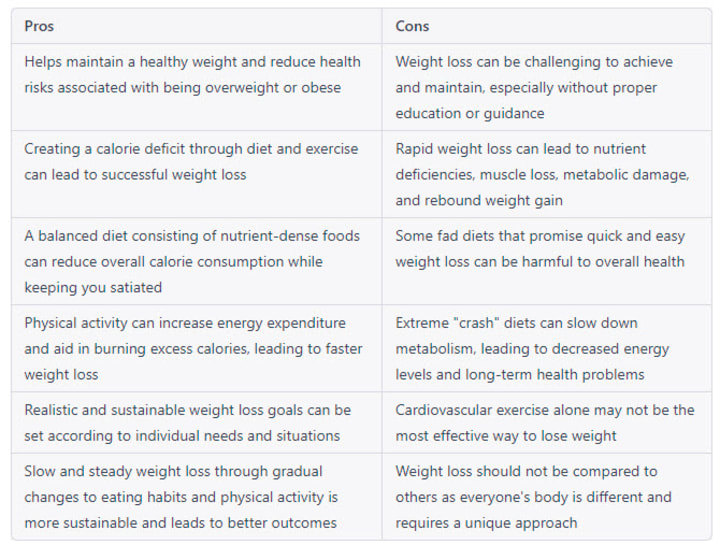
Introduction
Ladies and gentlemen, gather around! Today, we're going to solve the mystery of weight loss once and for all. Now, which of the following is the true statement about weight loss, you ask? Brace yourselves, because the answer might surprise you. The truth is that there is no one-size-fits-all solution. But before you roll your eyes and hit the back button, hear me out. This article is packed with helpful tips and insights on how to approach weight loss in a way that's healthy, sustainable, and most importantly, enjoyable. So grab a snack (yes, you read that right), sit back, and let's dive into the fascinating world of weight loss together.
Weight loss is a hot topic that has been the subject of much debate and controversy. It seems like every other day, there's a new fad diet or workout routine claiming to be the secret to shedding pounds and getting in shape.
With so much conflicting information out there, it can be hard to know what to believe. The truth is that weight loss isn't as complicated as it might seem.
At its core, losing weight comes down to burning more calories than you consume. This can be achieved through a combination of healthy eating habits and regular exercise.
Of course, it's not always easy to stick with these habits in the face of temptation and busy schedules, which is why many people struggle with weight loss. But by separating fact from fiction and learning about the basics of weight loss, you can set yourself up for success in achieving your goals.
The Basics of Weight Loss
Weight loss is a popular topic in the health and fitness industry. It's important for people to maintain a healthy weight to avoid various health issues that come with being overweight or obese.
The concept of weight loss is simple: you need to burn more calories than you consume. This means creating a calorie deficit by either reducing your caloric intake or increasing your physical activity levels.
Creating a calorie deficit through diet and exercise is essential for successful weight loss. A balanced diet consisting of nutrient-dense foods such as lean protein, whole grains, fruits, and vegetables can help keep you satiated while reducing your overall calorie consumption.
On the other hand, physical activity can increase your energy expenditure and aid in burning excess calories leading to faster weight loss. It's important to note those realistic and sustainable weight loss goals should be set according to one's individual needs and situation.
Rapid weight loss isn't always advisable as it can lead to nutrient deficiencies, muscle loss, metabolic damage, and rebound weight gain once normal eating habits are resumed. A steady pace of 1-2 pounds per week is often recommended as it allows the body to adjust gradually without feeling deprived or overwhelmed.
The Basics of Weight Loss
What is weight loss?
Weight loss is a simple concept: it's burning more calories than you consume. The basic principle behind losing weight is that your body needs to be in a calorie deficit state, meaning that you need to be consuming fewer calories than your body burns in a day. When you're in this state, your body begins to use stored fat as energy, resulting in weight loss.
Creating a Calorie Deficit through Diet and Exercise
Creating a calorie deficit can be achieved through both diet and exercise. When it comes to diet, the most effective way to lose weight is by reducing your calorie intake.
This means eating fewer high-calorie foods like processed snacks or sugary drinks and replacing them with nutrient-dense whole foods like fruits, vegetables, lean proteins, and healthy fats. Exercise can also help you create a calorie deficit by increasing the number of calories you burn each day.
Cardiovascular exercises like running or cycling are great for burning calories and improving heart health. Resistance training or weight lifting can also help build muscle mass which increases metabolism and helps the body burn more calories at rest.
Realistic Weight Loss Goals
It's important to set realistic goals for weight loss based on how much you realistically can lose within a certain amount of time. A safe rate of weight loss is 1-2 pounds per week.
While some may desire faster results, rapid weight loss often results in muscle loss instead of fat loss which isn't ideal for overall health. It's important to remember that everyone's body is different and so are their goals when it comes to losing weight.
It's best not to compare yourself with others as everyone has their own journey towards achieving their desired results. By focusing on creating a healthy lifestyle rather than just short-term changes, reaching those goals becomes both achievable and sustainable.
Common Myths About Weight Loss
Debunking the Magic Food Myth
Let's get one thing straight - there is no magic food or diet that will make you lose weight without any effort on your part. While some foods may have certain benefits when it comes to weight loss (such as high fiber or protein content), at the end of the day, it all comes down to creating a calorie deficit.
This means burning more calories than you consume through a combination of diet and exercise. So, don't fall for those fad diets that promise quick and easy weight loss by cutting out entire food groups or consuming only one type of food.
These diets are not sustainable, and they can actually do more harm than good in the long run. Instead, focus on incorporating a variety of nutrient-dense foods into your diet in appropriate portions while also engaging in regular physical activity.
The Dangers of Crash Dieting
We've all heard of someone who lost a significant amount of weight in a short period of time by following an extreme "crash" diet. However, what many people don't realize is that these types of diets are not sustainable or healthy for long-term weight loss.
When you drastically cut calories and restrict entire food groups from your diet, your body goes into survival mode and starts to conserve energy by slowing down your metabolism. This can lead to decreased energy levels, muscle loss, nutrient deficiencies, and even long-term health problems.
Instead, aim for slow and steady weight loss by making gradual changes to your eating habits and increasing your physical activity level over time. This approach is more sustainable and will lead to better outcomes for both short-term success and long-term health.
Busting the Cardio-Only Myth
While cardio certainly has its benefits when it comes to weight loss (such as burning calories), it's not the only way to shed those extra pounds. Strength training, for example, can help build muscle mass and increase your metabolism, allowing you to burn more calories even when you're not working out. Incorporating a variety of exercise modalities into your routine can also help prevent boredom and keep you motivated in your weight loss journey.
Try incorporating activities such as yoga, Pilates, or HIIT (high-intensity interval training) workouts to mix things up and challenge your body in new ways. So, don't limit yourself to just cardio if you want to see results - instead, focus on finding a workout routine that works for you and keeps you engaged and motivated.
Hormones and Weight Loss: The Surprising Connection
It may come as a surprise to many, but hormones play a significant role in our ability to lose or gain weight. Insulin, cortisol, and leptin are just a few examples of hormones that can either help or hinder our weight loss efforts. Insulin is responsible for regulating blood sugar levels and storing excess glucose as fat.
When we consume foods high in sugar or refined carbohydrates, our insulin levels spike, leading to the storage of more fat. Cortisol is known as the "stress hormone" and can increase hunger cravings while also promoting the storage of belly fat.
Leptin is responsible for signaling to our brain when we're full, but overconsumption of processed foods can lead to leptin resistance. The good news is that there are ways to balance these hormones through diet and lifestyle changes.
Eating a balanced diet rich in whole foods and complex carbohydrates can help regulate insulin levels. Reducing stress through activities such as yoga or meditation can help mitigate cortisol's effects on hunger cravings and belly fat storage.
Getting enough sleep (which we'll explore more in the next section) can also aid in balancing hormones like leptin. By understanding how hormones impact our weight loss journey, we can make better choices for long-term success.
Sleep: The Unsung Hero of Weight Loss
When it comes to weight loss, most people focus on diet and exercise - but sleep should not be overlooked! Lack of quality sleep has been linked to increased appetite (especially cravings for high-fat, high-carbohydrate foods), slower metabolism, lower energy levels during exercise, and even altered insulin sensitivity. To truly optimize your weight loss efforts, it's important to prioritize getting sufficient sleep each night.
So how do you improve your sleep quality? First off, aim for 7-9 hours of uninterrupted sleep each night.
Establishing a consistent bedtime routine (such as reading a book or taking a warm bath) can signal to your body that it's time to wind down. Limiting exposure to screens (phones, TVs, etc.) before bed can also help improve sleep quality.
If you struggle with falling or staying asleep, consider incorporating relaxation techniques such as deep breathing or progressive muscle relaxation. By prioritizing your sleep and making changes to promote better rest, you may find it easier to achieve your weight loss goals.
Conclusion
There's no magic pill or shortcut when it comes to weight loss - but by understanding the basics (calorie deficit through diet and exercise), dispelling common myths (no quick fixes here!), exploring niche subtopics (hormones and sleep), and finding what works for you as an individual, you can set yourself up for success in the long term. While weight loss can be a challenging journey, remember that small steps forward add up over time - so celebrate each victory along the way!
Pros and Cons to Keep in Mind When Choosing a Weight Loss Plan






Comments
There are no comments for this story
Be the first to respond and start the conversation.